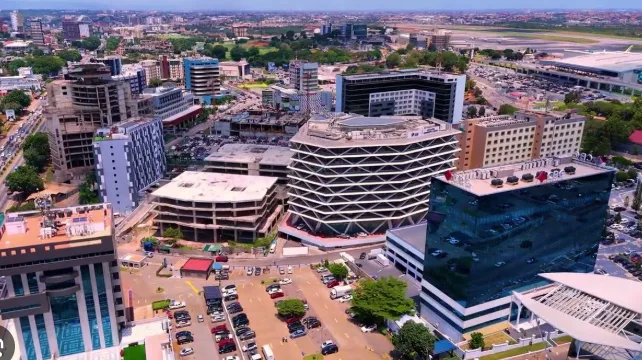
Airport City Accra is experiencing an unprecedented infrastructure-driven transformation that’s sending property values soaring. With $2.6 billion in planned developments reshaping Ghana’s premier business district, property investors are witnessing one of West Africa’s most compelling investment opportunities unfold before their eyes.
Picture this: You’re standing in today’s Airport City, watching construction cranes reshape the skyline while luxury developments rise around Kotoka International Airport. What you’re witnessing isn’t just construction—it’s the birth of Ghana’s most valuable real estate corridor, where property values are projected to surge 15-50% over the next five years.
What major infrastructure projects are transforming Airport City?
The transformation centers on several game-changing developments. Kotoka International Airport’s Terminal 2 repurposing project will finish in the second quarter of 2025. It will handle both domestic and international flights, helping to reduce congestion. This $274 million facility will serve 5 million passengers every year. There are plans for a 100-acre Airport City 2 with sports complexes and shops.
Transportation improvements include the $660 million Accra-Tema Motorway reconstruction beginning January 2024, plus the revolutionary $2.6 billion Accra SkyTrain project creating a 194-kilometer elevated railway system with major Airport City stations.
Commercial developments are equally ambitious and transformative. The expansive 140-acre Ghana International Trade Fair Center is undergoing complete transformation into a modern mixed-use smart estate hosting luxury hotels, high-end malls, and premium residential components.
How do infrastructure improvements drive property values upward?
Historical data reveals powerful patterns. Properties within 0.5 miles of transit stations outperformed regional averages by 41.6% during economic downturns, while transport infrastructure typically generates 10-30% property value increases.
Dubai’s Al Maktoum Airport expansion provides a compelling benchmark. The $35 billion project drove 20% rental increases in 2025 alone, with 15-20% property price growth projected. Properties initially priced 60% below prime areas experienced rapid appreciation as infrastructure neared completion.
Airport City properties now average $2,800 per square meter. This is 7.1% higher than East Legon. They also have much higher prices than Cantonments and Labone. This premium positioning reflects infrastructure proximity and development momentum.
Rental markets show exceptional strength with 6-8% annual yields for residential properties. Three-bedroom properties command $2,500-$4,000 monthly rents, while luxury units achieve premium pricing reflecting strategic location advantages.
When should investors enter the Airport City market?
2025 represents the optimal investment window based on converging factors. Ghana’s economy projects 19.3% expansion over five years with 3.9% average annual growth, while 57.3% urbanization rates drive housing demand. The undervalued Ghanaian Cedi creates favorable entry conditions for foreign investors.
Market cycle analysis indicates Airport City is in an early growth phase with infrastructure-driven appreciation potential. Supply constraints from Ghana’s 2 million unit housing deficit create upward price pressure, while demand from diaspora investment and expatriate housing needs supports sustained appreciation.
Most significant value increases occur within 2-3 years post-infrastructure completion. Pre-construction phases typically generate 5-15% price increases upon project announcement, while construction phases maintain momentum through infrastructure visibility.
What should property investors consider before buying?
Strategic investors must address multiple considerations. Currency risk demands USD-denominated lease structures and targeting hard-currency paying tenants. Legal due diligence requires Lands Commission verification, title insurance, and qualified property lawyers.
Infrastructure backup systems including generators and water storage address potential utility interruptions. Market comparable analysis and rental yield calculations provide investment viability metrics, while exit strategy planning maintains liquidity options.
Current financing challenges include elevated 25-35% mortgage rates, requiring strategic approaches like maximizing cash down payments and securing favorable fixed-rate contracts during applications.
Why VAAL Group positions clients for Airport City success
VAAL Group’s comprehensive market analysis reveals specific opportunities within Airport City’s luxury residential segment. Our expertise navigating Ghana’s regulatory environment, combined with deep understanding of infrastructure impact patterns, positions clients for maximum return capture.
Our developments like Agora and Legato Heights demonstrate our commitment to premium locations with infrastructure proximity. We provide full lifecycle support including financing solutions and transparent investment guidance.
Airport City’s infrastructure revolution creates extraordinary opportunities for prepared investors seeking exceptional returns. With strong government support and committed international developers, there is a chance for growth. The next 18 months are important for capturing value before property prices rise to high levels.
Frequently Asked Questions
What infrastructure projects will most impact Airport City property values?
The Terminal 2 repurposing, Accra SkyTrain project, and Pullman hotel development represent the most significant value drivers, with completion timelines through 2026-2027.
How much can property values increase from infrastructure development?
Based on international benchmarks and local patterns, Airport City properties could appreciate 15-50% over five years, with 2-3 year acceleration periods post-completion.
When is the best time to invest in Airport City properties?
2025 represents optimal timing due to early-phase market cycle positioning, favorable currency conditions, and infrastructure project momentum before completion drives premium pricing.
What returns can investors expect from Airport City properties?
Total returns of 11-18% annually combine 6-8% rental yields with capital appreciation, providing 8-12 year payback periods for quality properties.
How does VAAL Group help clients succeed in Airport City investments?
VAAL provides comprehensive support including market analysis, regulatory navigation, financing solutions, and property management services optimized for Airport City’s unique opportunities.
Ready to capitalize on Airport City’s infrastructure revolution? Contact VAAL Group today for exclusive access to premium investment opportunities in Ghana’s most promising property market.